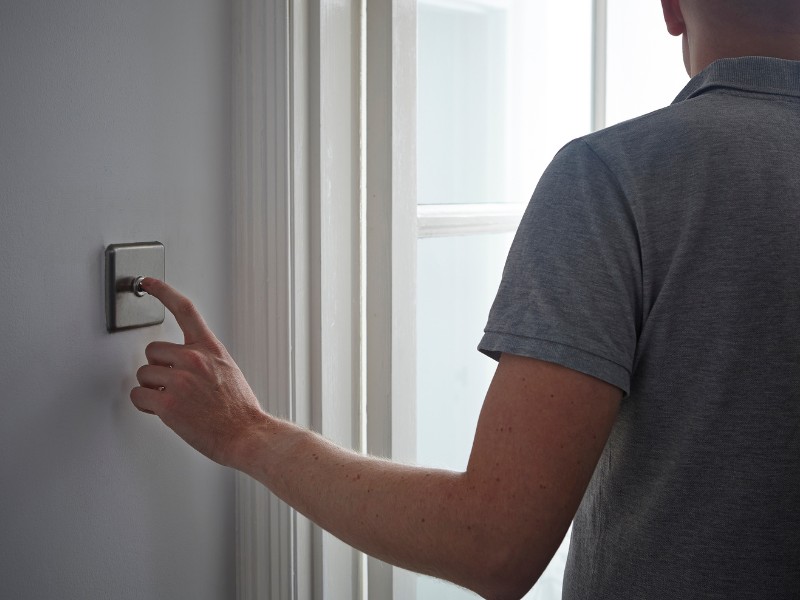13 Ways to Save Money Around Your Home

This post may contain affiliate links. At no cost to you, we earn a commission from qualifying purchases.
It’s said that there is really no place like home but it’s hardly ever said there’s no place like a home that costs you a little less each month either!
Considering how much time we actually spend in our homes sleeping, eating, entertaining ourselves – not to mention keeping ourselves warm or cool, how much effort do we really put into thinking about how we could be making considerable savings?
Given that home is our Oasis from the often difficult and tiring world outside, changing our little safe haven might not seem like an attractive option. However, a few simple changes (for the better) will make a huge difference and will mean that the money you save can be spent on something else to improve your time at home.
1. Find and fix draughty doors and windows
In early autumn, buy draught excluders and fit them to all entrance and internal doors. If you are unconvinced this will help, light a joss stick and hold it near the bottom of a door and see how the smoke is affected by the draught blowing in. The same can be done with windows. Sometimes, the gaps are relatively small, but they still let in the cold. You’ll notice it more when the wind is howling outside.
2. Change curtains to suit the season
Invest in thicker curtains for winter time and close them when it gets dark or the temperature drops. Change the curtains in summer for lighter fabric such as muslin to provide privacy as well as letting the air through while deflecting the sun’s glare. In winter, thicker curtains will make a massive difference to your own comfort and your heating bill.
3. Reduce washing machine usage
Only put the washing machine on when you have a full load ready for washing – less hot water is used in the process because the drum is fuller meaning less water needs to be heated. If you think about it, most of us have more than enough clothes to last out until the next wash so why not see if you can half the number of washes you do each week?
4. Choose a lower temperature washing program
Most washing powders and detergents now promise to get clothes clean at 30C or even less. By turning the temperature down on the washing machine it saves money on the bills. Most of the clothes we wash may be only lightly soiled so choosing a quick, low temperature wash will be more than adequate to ensure a clean set of clothes.
5. Fill up the dishwasher
Wait until the dishwasher is completely full before you put it on. Use an economy or lower temperature program if your dishes are not heavily soiled and you’ll save plenty!
6. Change the program on your tumble dryer
When tumble drying clothes, tumble them on the iron program. Clothes will feel slightly damp but this is the point when you should iron them. Ironing them damp will not only reduce the drying time spent but also the effort needed to iron them and in turn, reduce the amount of electricity you will need trying to remove dried-in creases!
7. Put on extra layers of clothing
Unless you live in the tropics, consider putting on a sweater when you are in the house and then turn the heating down a couple of degrees. Simple changes like wearing slippers or adding an extra blanket to your bed help keep you warmer and the heating bills lower.
8. Keep your freezer full
Most modern freezers are ‘frost free’ but did you know that keeping your freezer full reduced the amount of space that needs to be cooled? Try to keep your freezer fully stocked with food or fill the space with empty plastic food storage boxes instead. If you have an older freezer, keeping the thing full will also help prevent it becoming frosted up.
9. Take a shower instead of a bath
Take a shower instead of a bath – ¼ of the water, ¼ of the electricity too, not to mention that you don’t have to clean the bath out afterwards! If you really want to save money, set a timer to two minutes and stick to it every time you shower.
10. Let nature cool you
Rather than switching on the air conditioning or an electric fan, open the windows on opposite sides of the house. Most buildings cause some sort of air disturbance and this means if you create a ‘channel’ through which the air can pass it will cool down your rooms without wasting electricity. Even on days when the air is still, there’s always some air flow.
11. Learn how to use your refrigerator correctly
Most modern refrigerators are ‘zoned’ into different cooling areas and by placing the correct food items within those zones will make the most out of the space. You should be able to reduce the cooling temperature a little – again, reducing electricity consumption.
12. Fill the oven before you fill your plates
If you are cooking a roast or something that uses the whole oven for just one dish, consider putting vegetables into a lidded container to cook in the oven too, rather than putting them on the hob. Why heat an empty space?
13. Turn off the lights when you leave a room
Turning off the lights when you leave a room is a good habit to get into. It will save money and energy in the long term.





